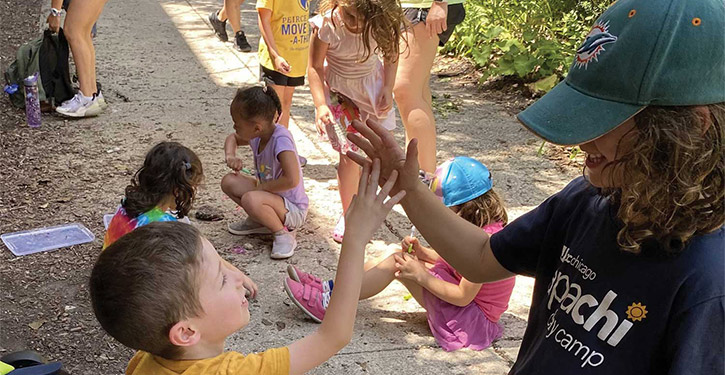Creative ways to staff summer camp amid labor shortages.
Last summer, JCC Chicago served over 3,500 children from ages three to 13 across nine different summer camps.
Those countless hours of memories and opportunities for the youth in one of the country’s biggest cities would not be possible without a massive effort to adequately staff each camp.
Addie Goodman, the president and CEO of JCC Chicago, said their legacy and tradition of day camps is successful because of months of preparation.
“At its core, JCC Chicago’s summer programming is all about growing good kids,” said Goodman. “Recruiting begins in earnest around Thanksgiving to ensure full staffing of nearly 800 counselors, lifeguards and specialists.”
Goodman said due to their history of successful summers, many camp employees were actually attendees in their younger years. However, she said it’s increasingly challenging to find workers due to school and young adult schedules.
Addressing the Great Resignation
Staffing is now more difficult in the wake of the COVID-19 pandemic and the “Great Resignation.” Jason Schaitz, the parks and recreation director at the City of DeBary, Florida, who has over 15 years of experience managing youth sports and camps, said one solution to finding more workers is raising potential salaries.
“Now more than ever it’s coming down to the rate of pay,” said Schaitz. “Rates are rising so fast in the private sector it’s becoming very hard to keep up in the public and nonprofit sectors.”
Coincidentally, Goodman said this exact strategy was implemented at JCC Chicago to meet shortages head-on.
“Last year, summer stipends were increased to $15 an hour to be competitive with other local programs and help ensure the hiring of top-tier applicants,” said Goodman. “In addition, the agency offers referral bonuses to seasonal staff, which further builds the camp staff community.”
However, offering a meaningful raise isn’t an option for every community rec center. Fortunately, Schaitz provided a few other ways to recruit the right employees.
“If you cannot pay at or above market rate in your area, the best incentive to give is flexibility with schedules,” said Schaitz. “Ideally, you want summer staff to be able to commit to your entire summer program. If you have the ability, be flexible and have the structure in place to still provide the necessary coverage to your program.”
Schaitz said another great incentive is to provide paid training or certifications. Those that are looking for a career in this field or in education can generally use those certifications when they move on to pursue full-time positions. These opportunities will help attract new recruits so they can further build their resumes.
“The group we have had the most success with is those in college — ages 18 to 22 — who are studying to be a teacher, or work in recreation or other childcare fields,” said Schaitz. “It gives them great experience while still being able to go to school and complete their degree. They are motivated to return each year because they want to work around children for a living.”
Outreach Tactics
JCC Chicago is seeing similar trends with potential summer camp employees. Goodman said they are utilizing multiple outreach tactics to establish relationships with young adults.
“We operate after-school clubs in more than 20 high schools, and we lean on those connections for summer staff recruitment,” said Goodman. “In addition, the agency’s teen staff are deployed to camps in the summer months when school is out of session. Seeking summer staff from existing staff pools and of-age programming have been successful strategies.”
Schaitz said other ways to build these relationships is by contacting departments directly at your local university to see if the faculty can help you recruit.
“Once they graduate, it’s usually hit-or-miss if you’re able to retain them, but if you get them their freshmen year, they can potentially stick around for four years,” said Schaitz. “Where I have seen groups fall short is when they’re not willing to hire due to lack of experience. Many of these types of positions are entry-level which means they will get that experience starting out with you.”
At JCC Chicago, Goodman said they use CampMinder — a summer camp management software system — to efficiently streamline the hiring process with potential employees of any age.
Anaheim Family YMCA also uses software and other tools to assist in staffing like Daxko, the education job site EDJOIN.org, social media and local colleges.
Cristina Casas, the community engagement director at the Anaheim Family YMCA, said their summer resident camps are operated entirely by high-quality, experienced and trained volunteers who are interviewed, background checked and vetted by a program director.
Finding the Right Fit
All volunteers and staff must also pass a course in child abuse prevention training which includes how to report abuse to the proper authorities.
“The Y ensures we hire candidates who can make an impact helping young people grow physically, mentally and spiritually,” said Casas. “Camp leaders are sensitive to every youth’s diverse needs and unique personalities and strive to create a valuable experience for everyone.”
Casas recommended one way to hire reliable employees is to recruit individuals who are openly showcasing on social media that they want to make a difference in their community. She added hosting virtual job fair events and posting your openings regularly could also be successful strategies.
“Promote and advertise your posts as well,” said Casas. “Ask partners to promote YMCA and volunteer openings through email and their social media. Attend Y programs like sports practices/games, and do a quick commercial directly to the Y families.”
Through all these different approaches of staffing summer camp, the common thread is embracing change. It’s this acceptance of an evolving workforce Goodman said is critical to sustainable staffing.
“Sticking with the way it’s been done is a certain recipe for failure,” said Goodman. “For example, penalties for missing a day will alienate staff and further deteriorate an already challenging staffing environment. Overall, each day camp director leverages relationships with current and past staff, enrolled families, and the community to best staff their camps fully. Counselors who feel valued are counselors who choose to return and bring their friends with them.”
Photos courtesy of JCC Chicago.











